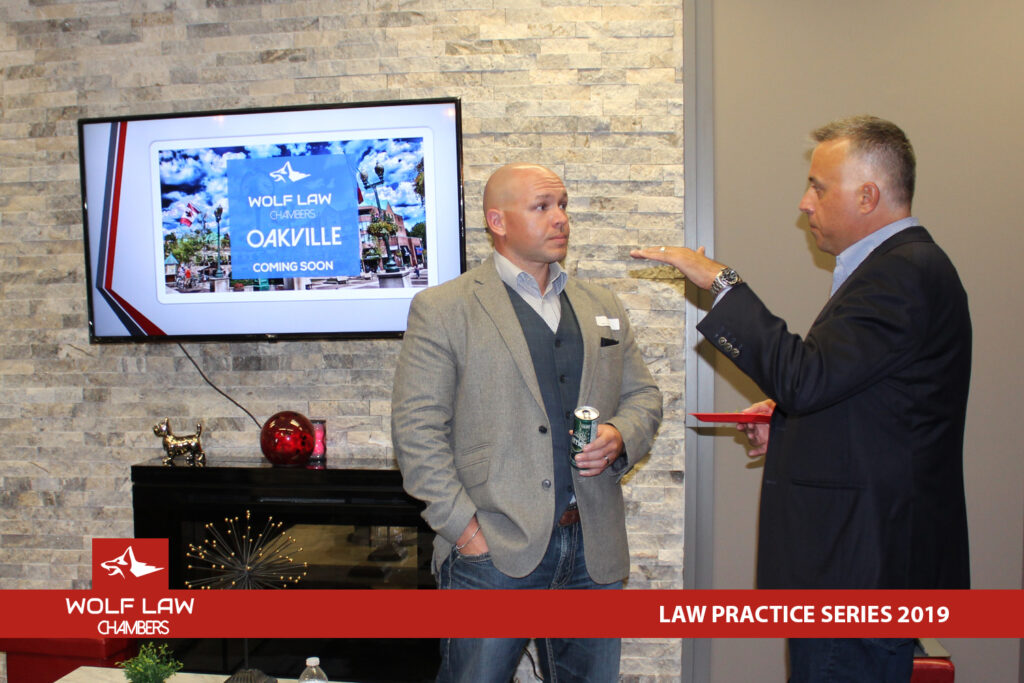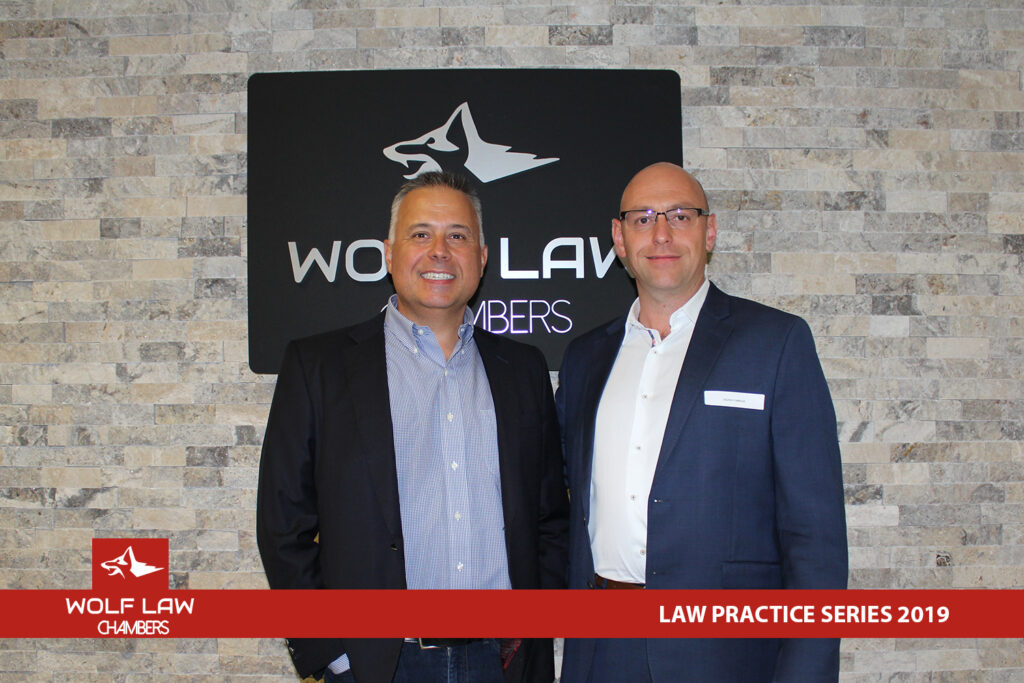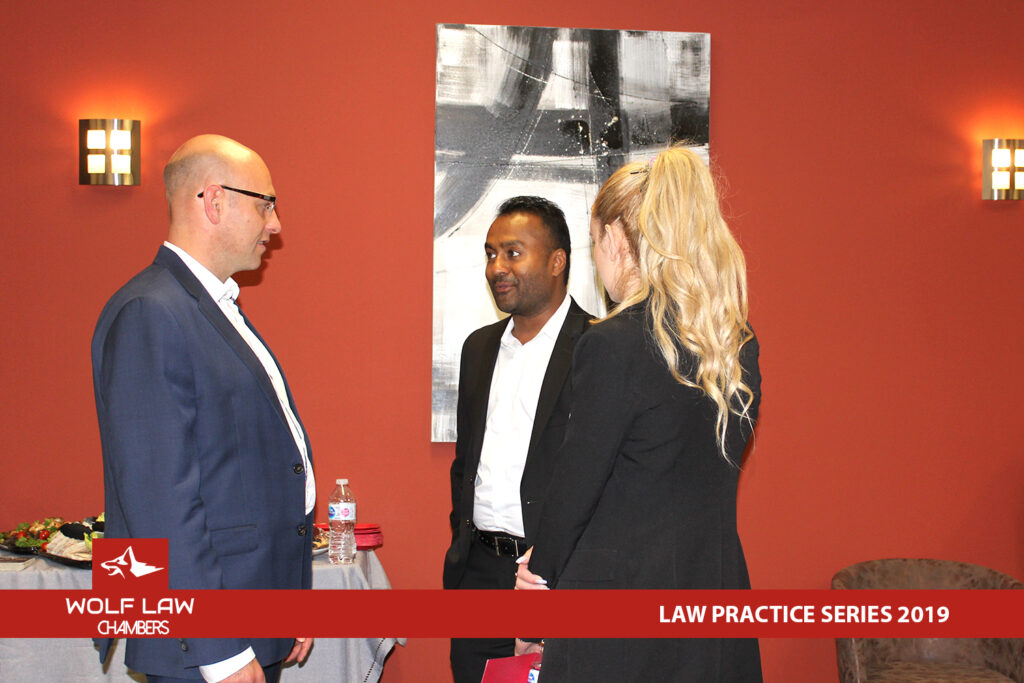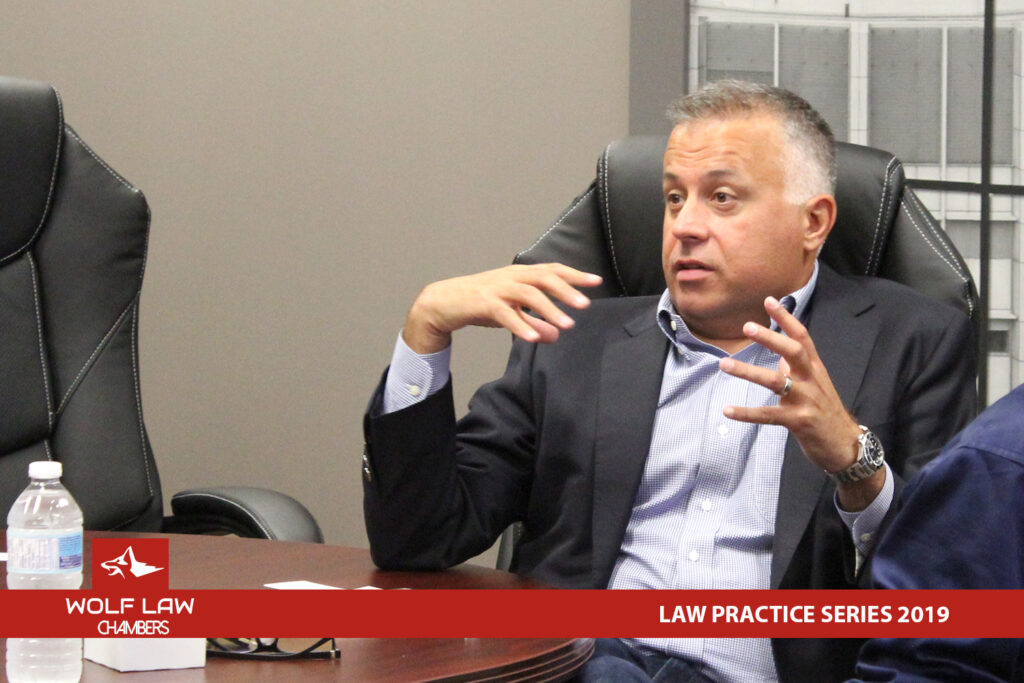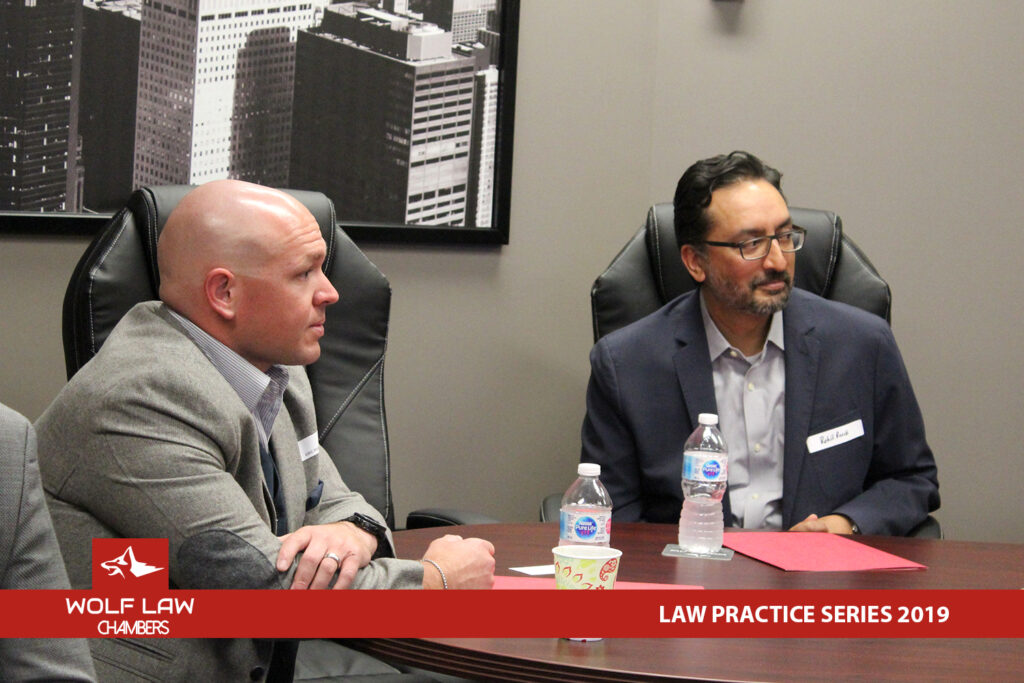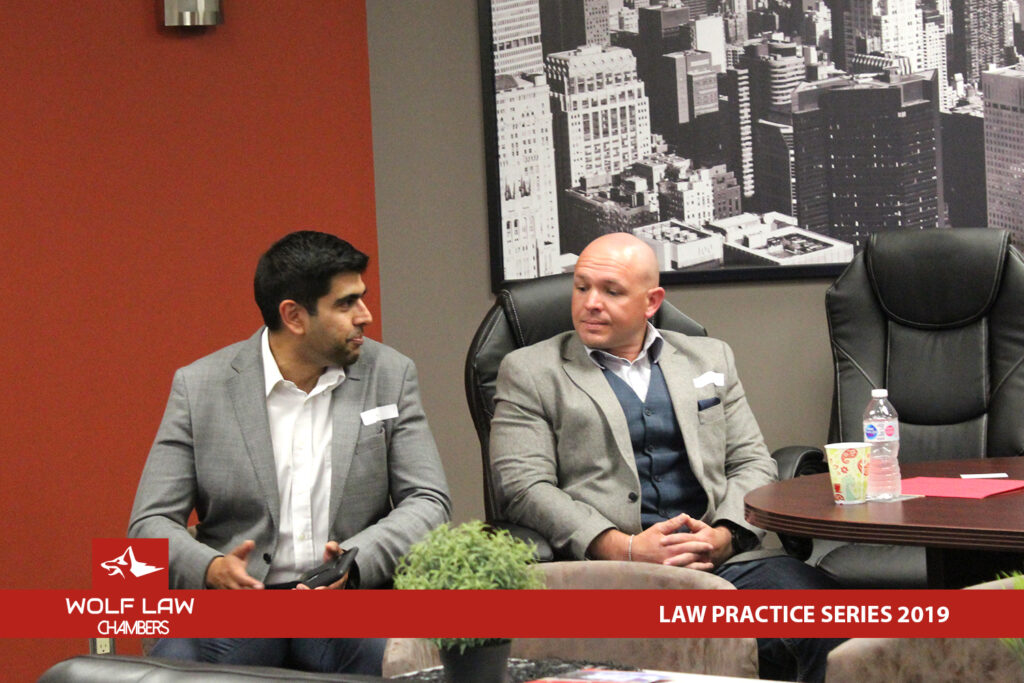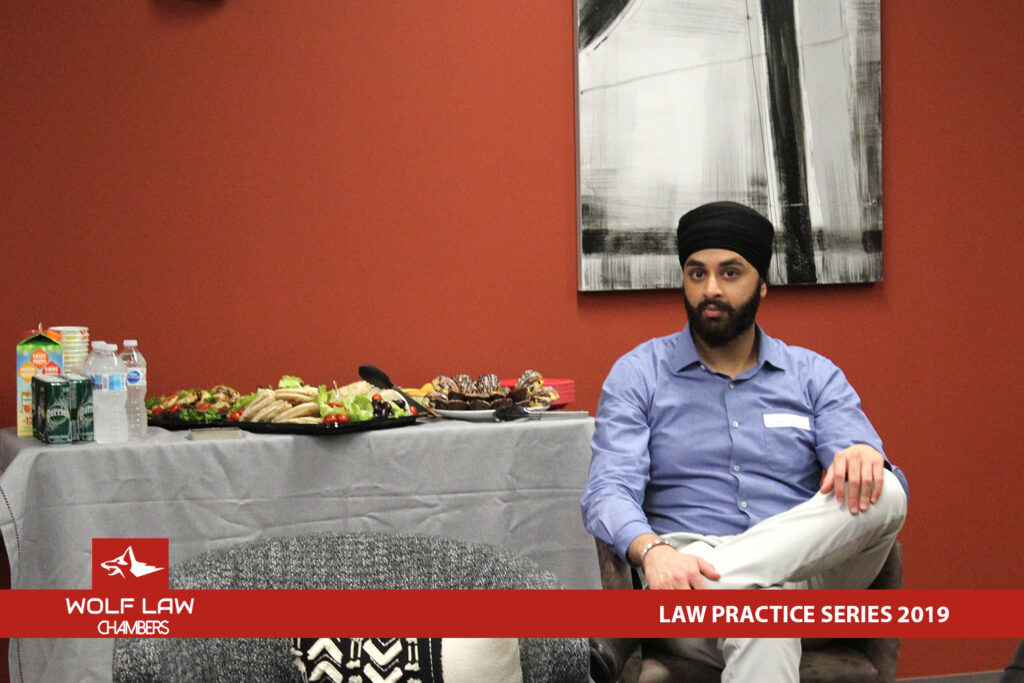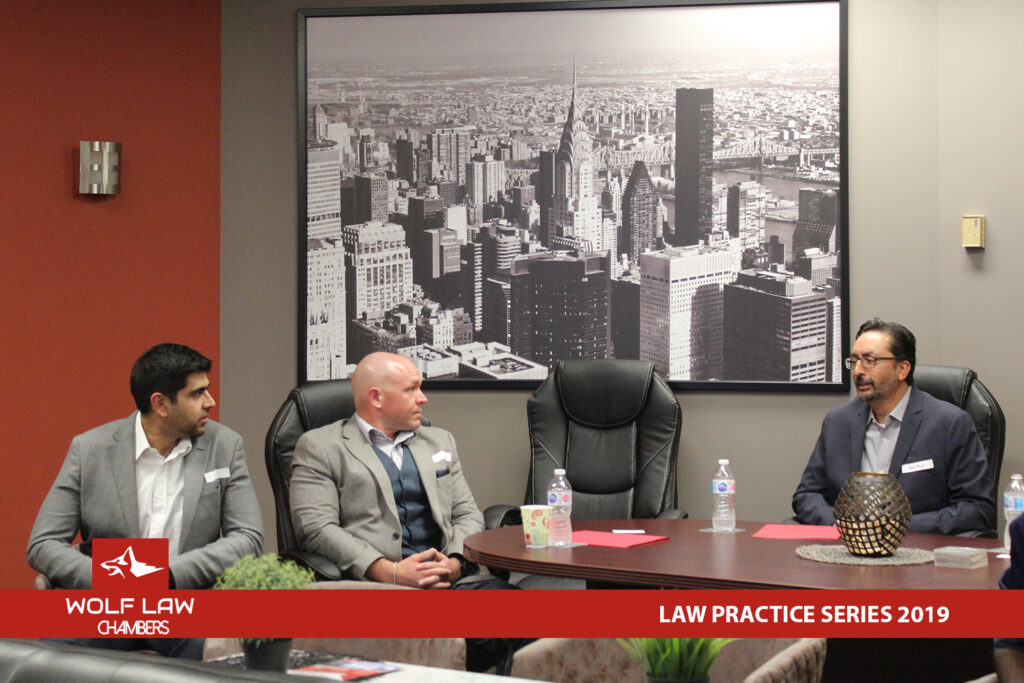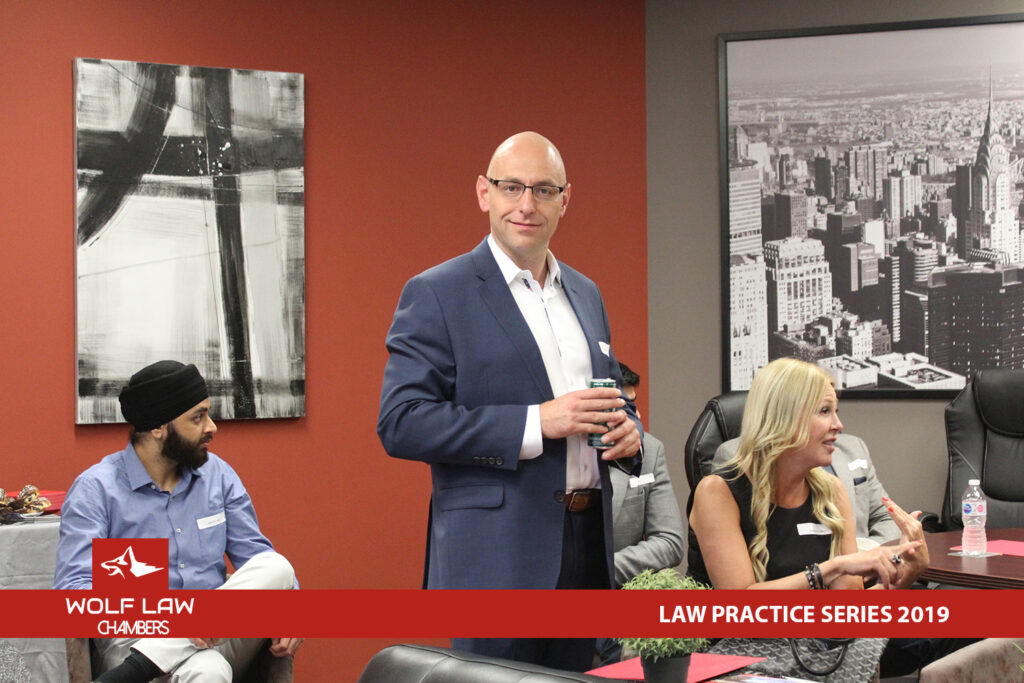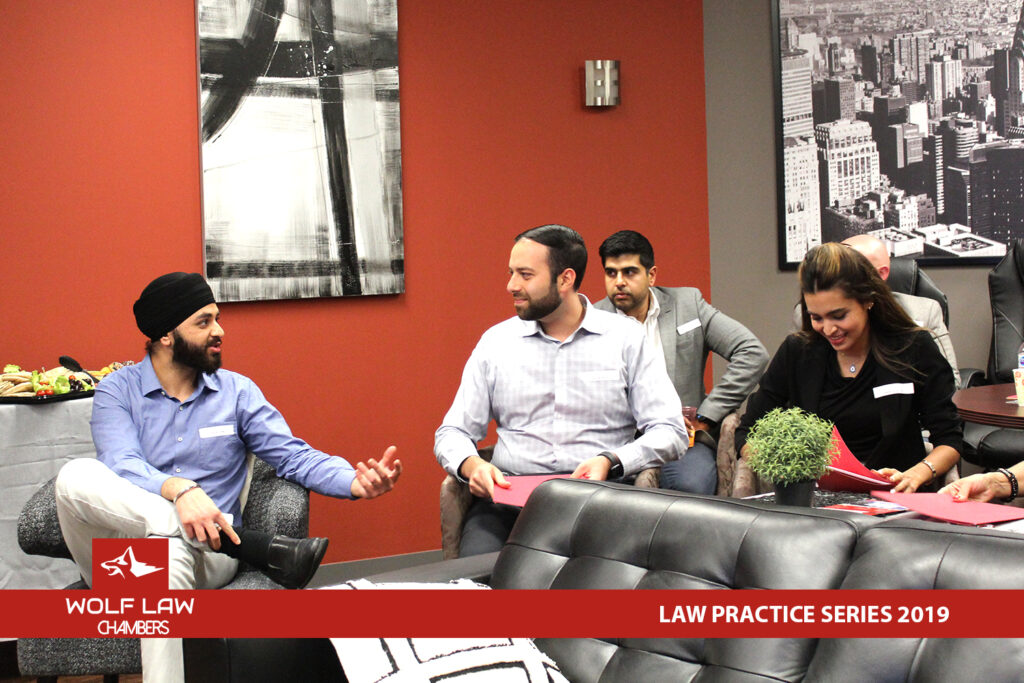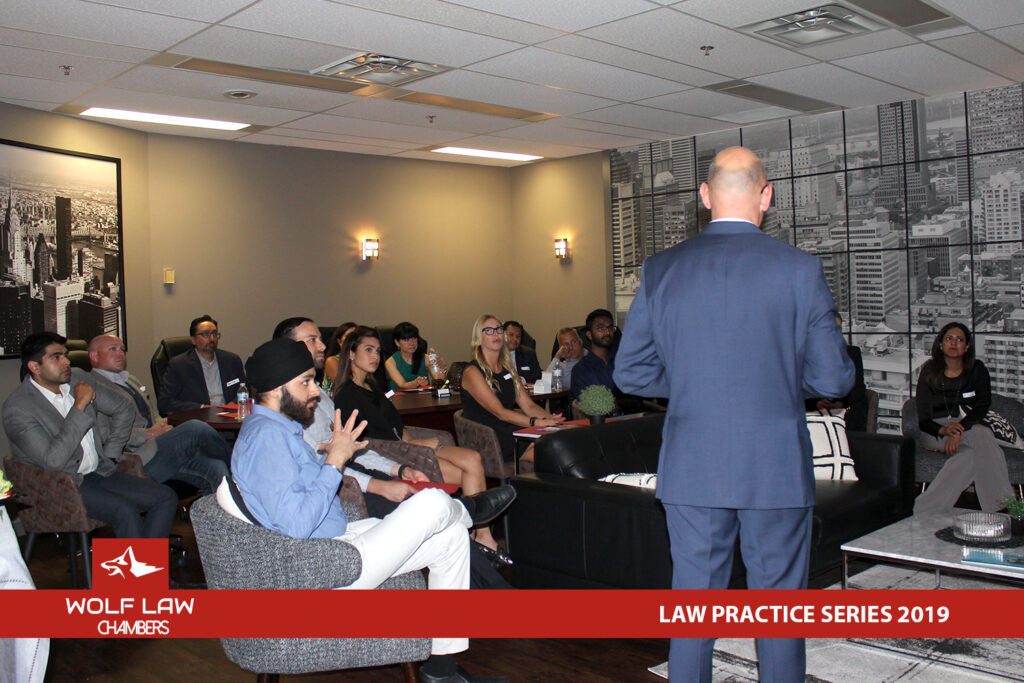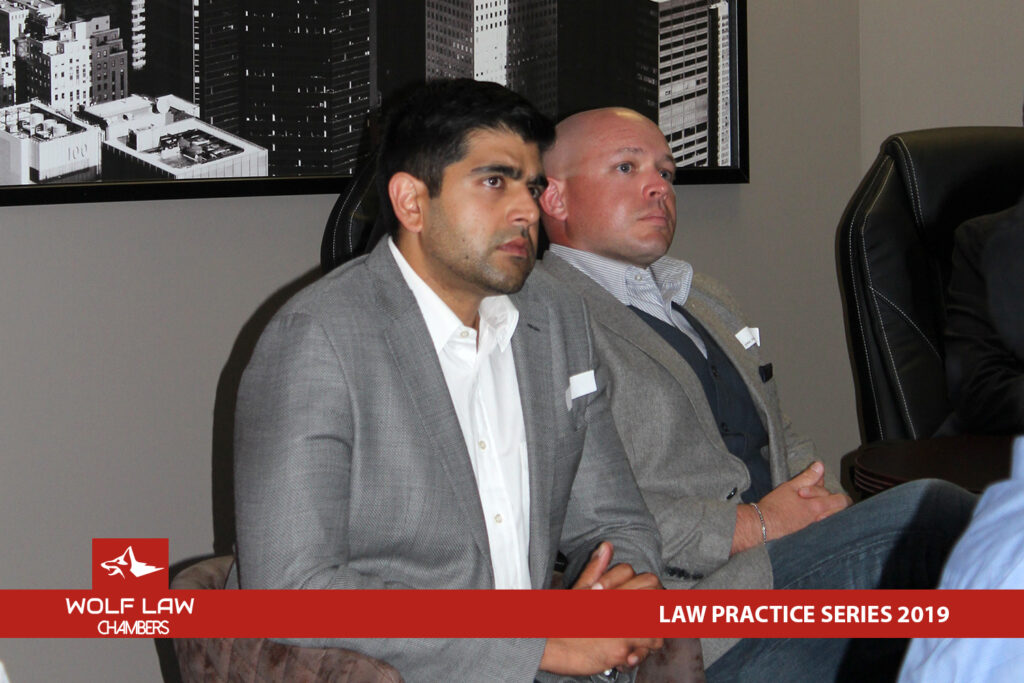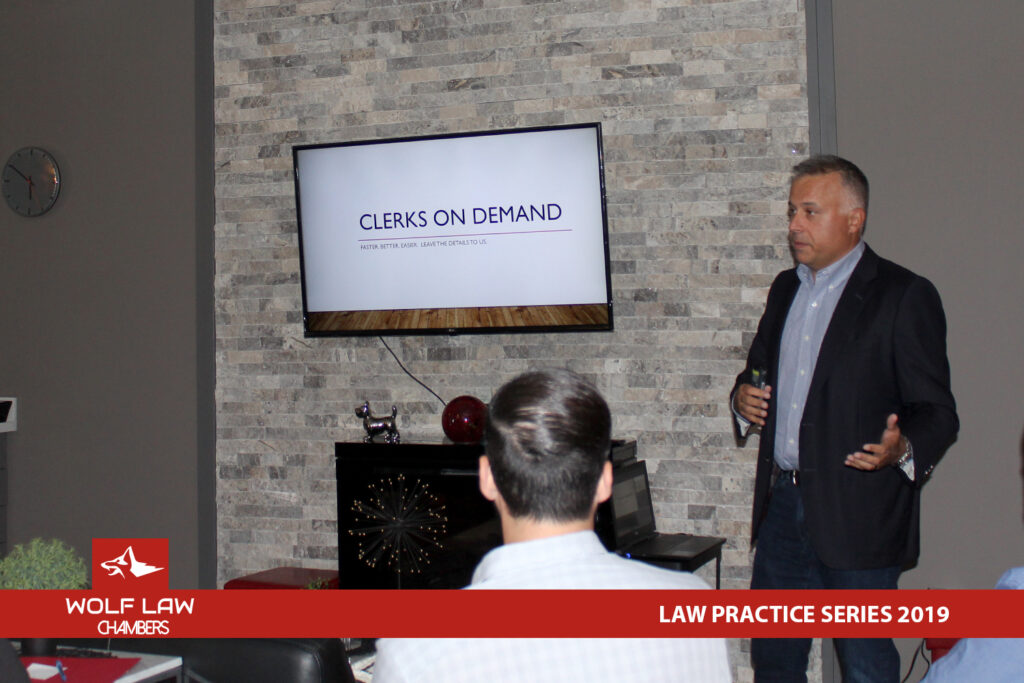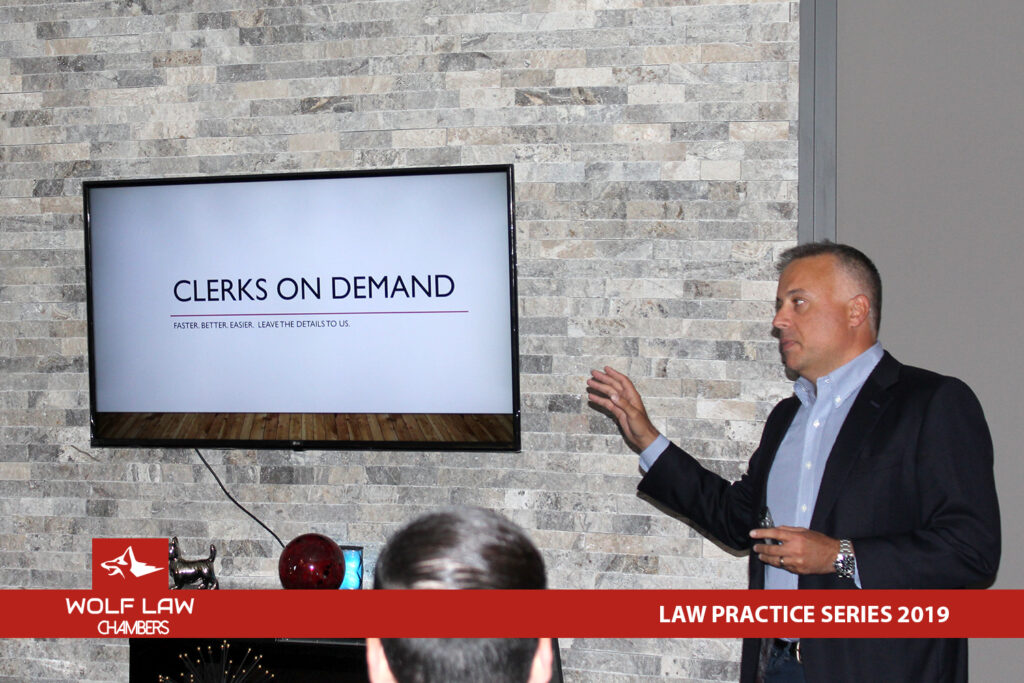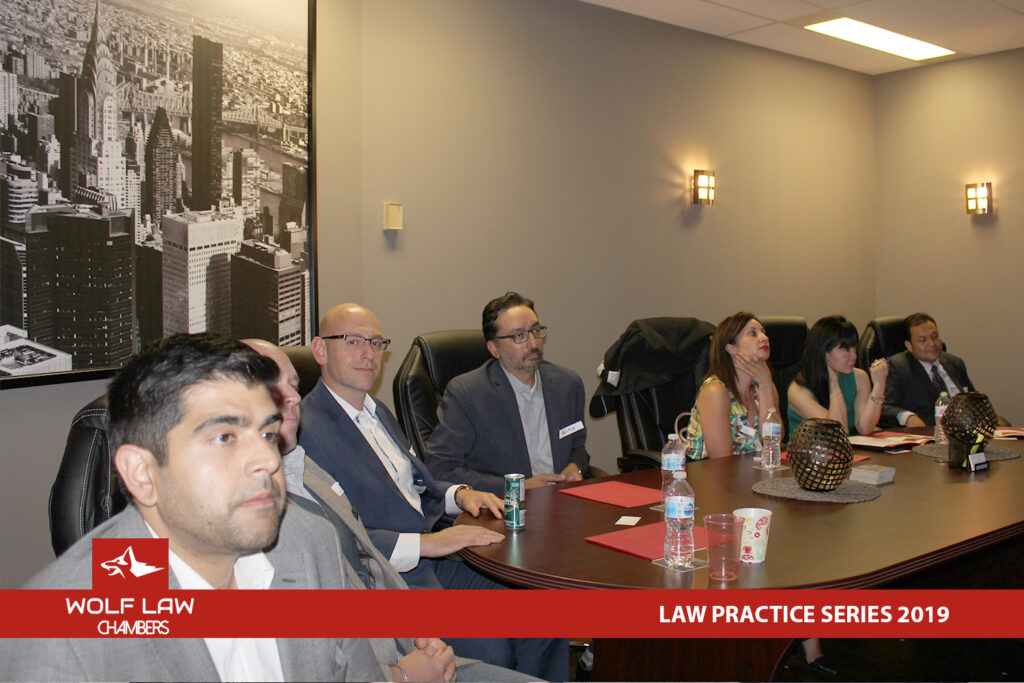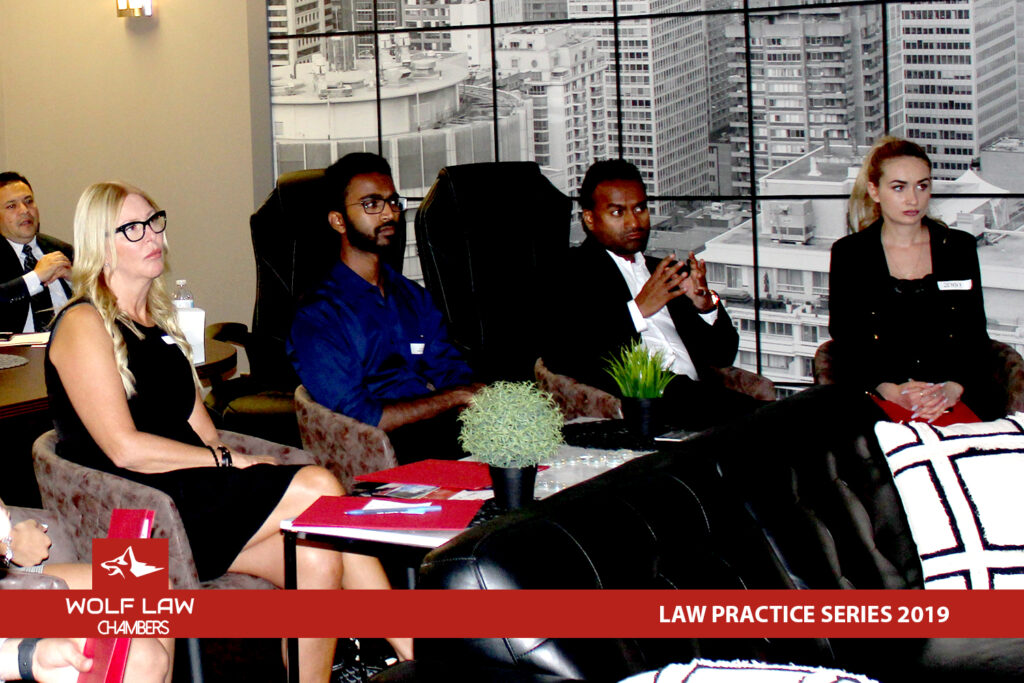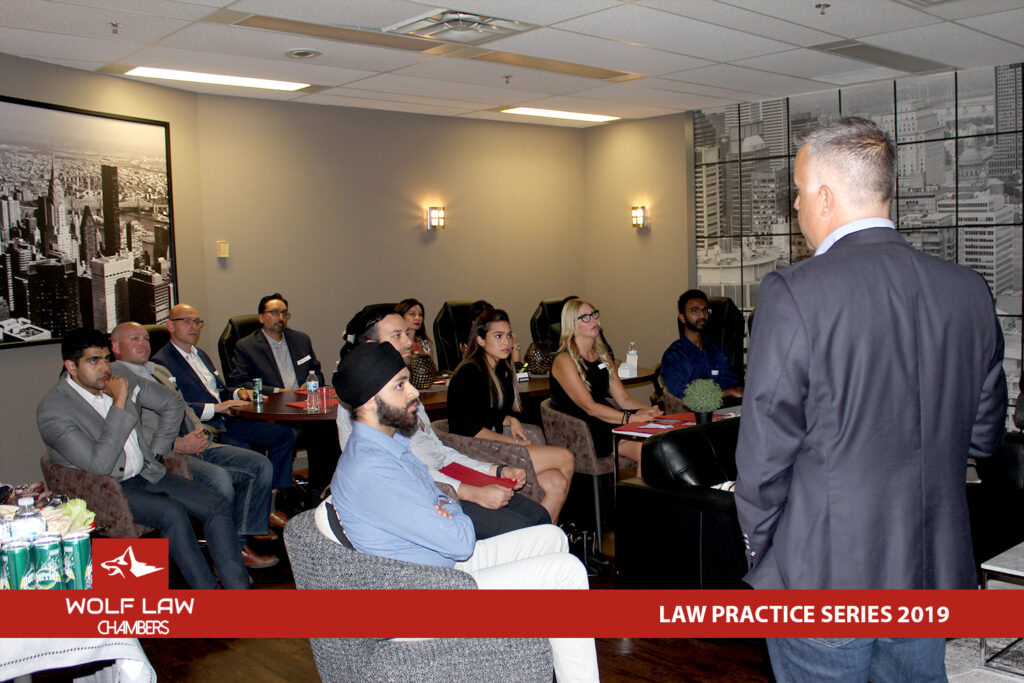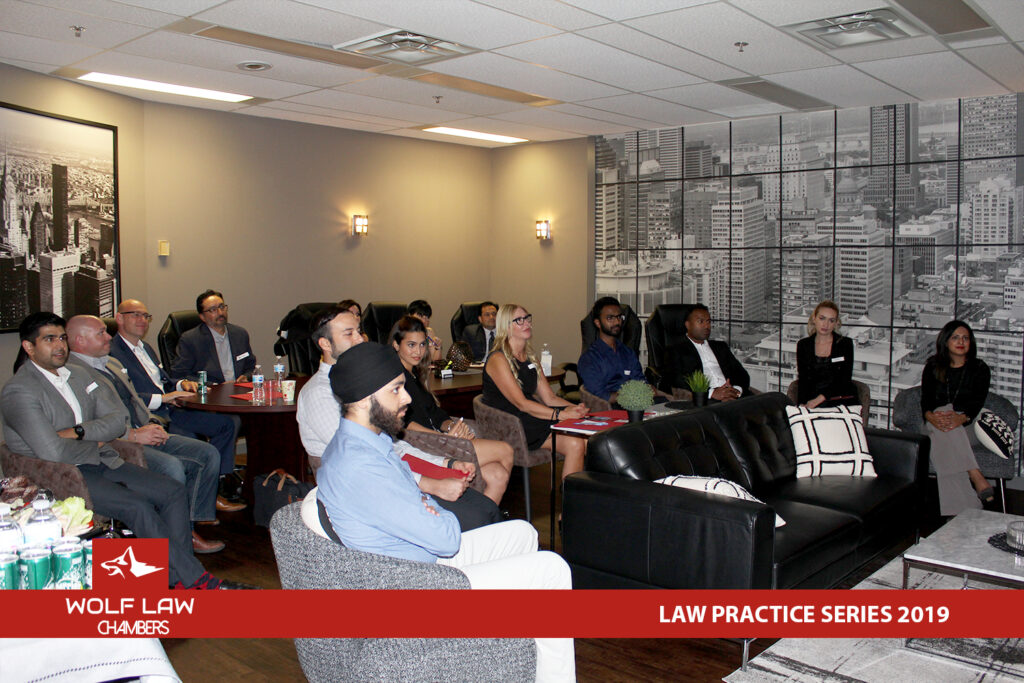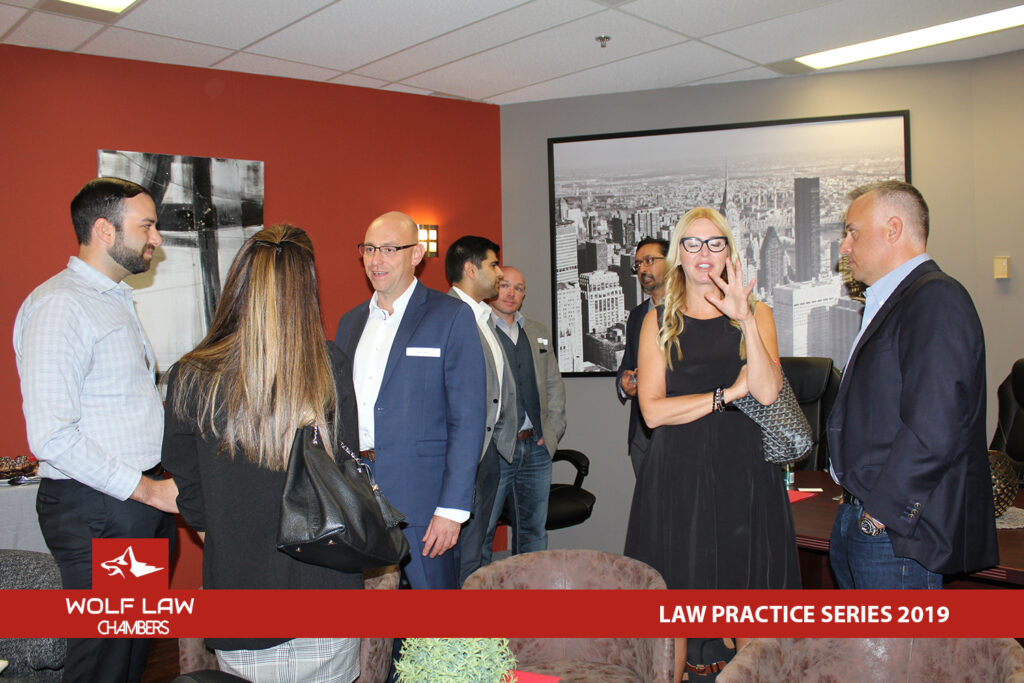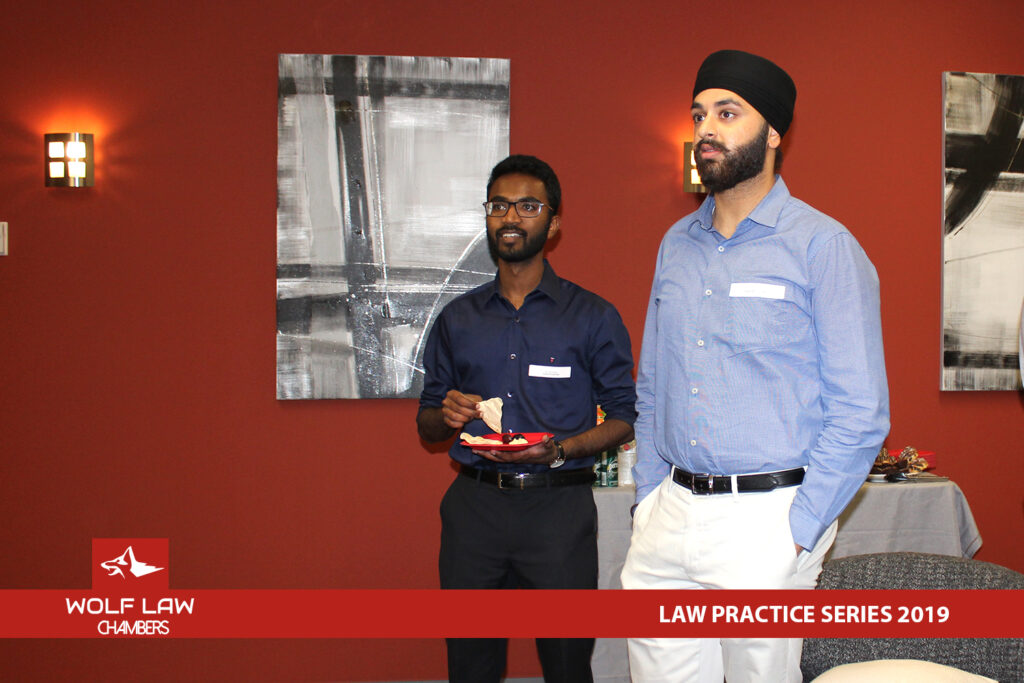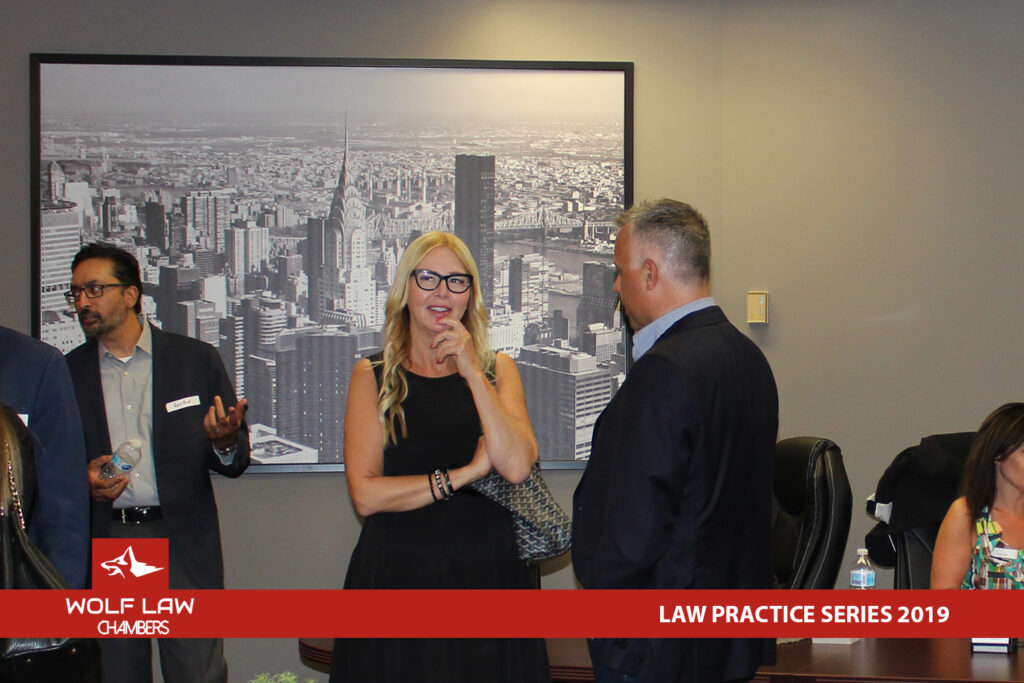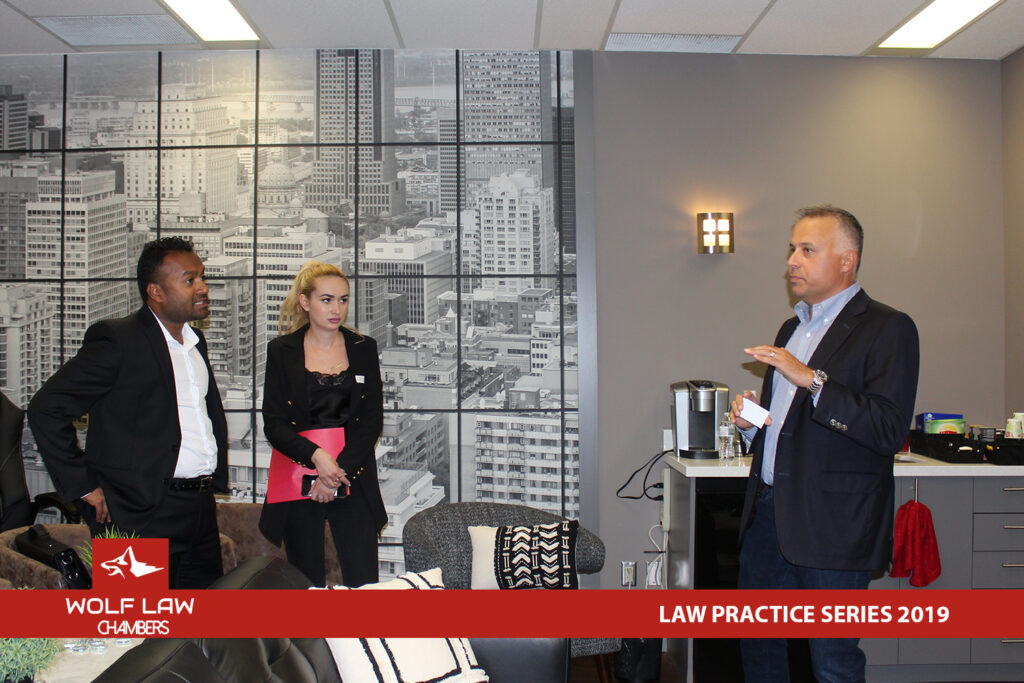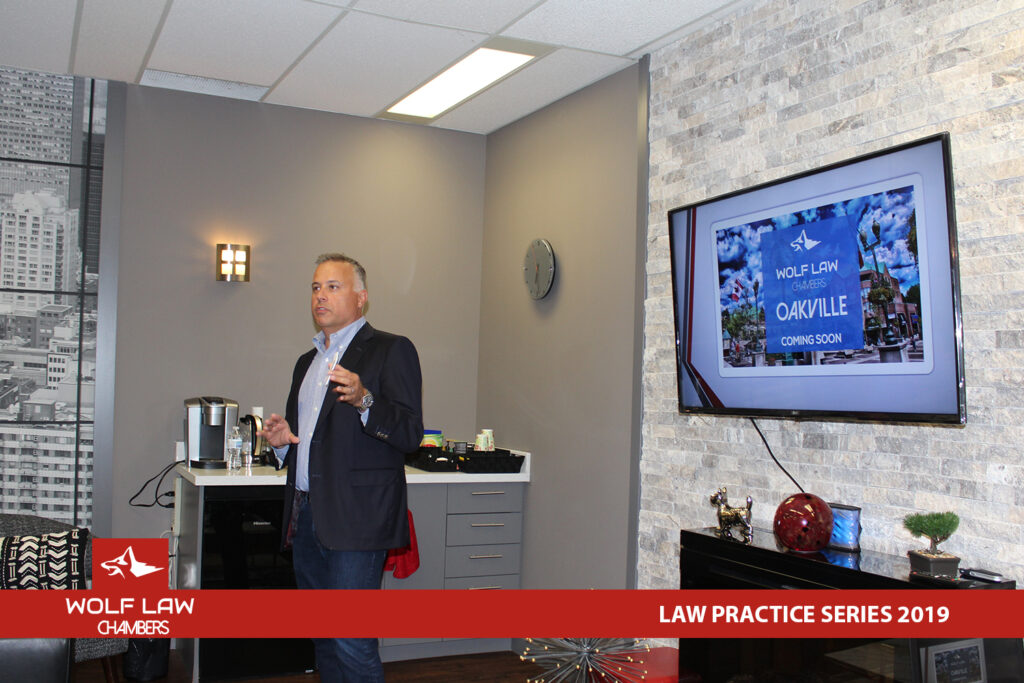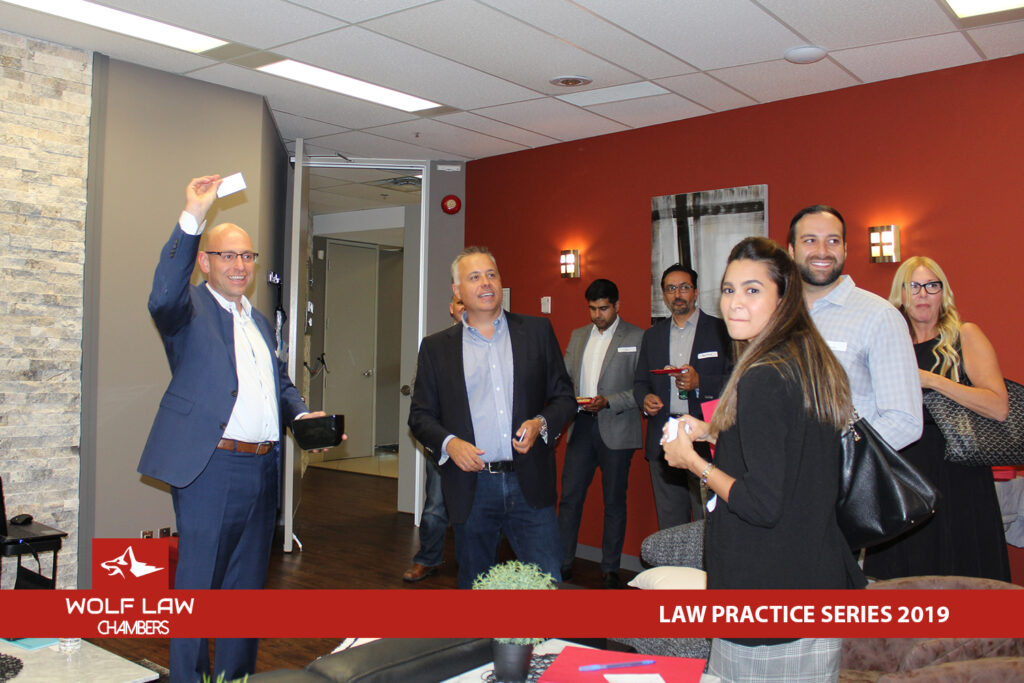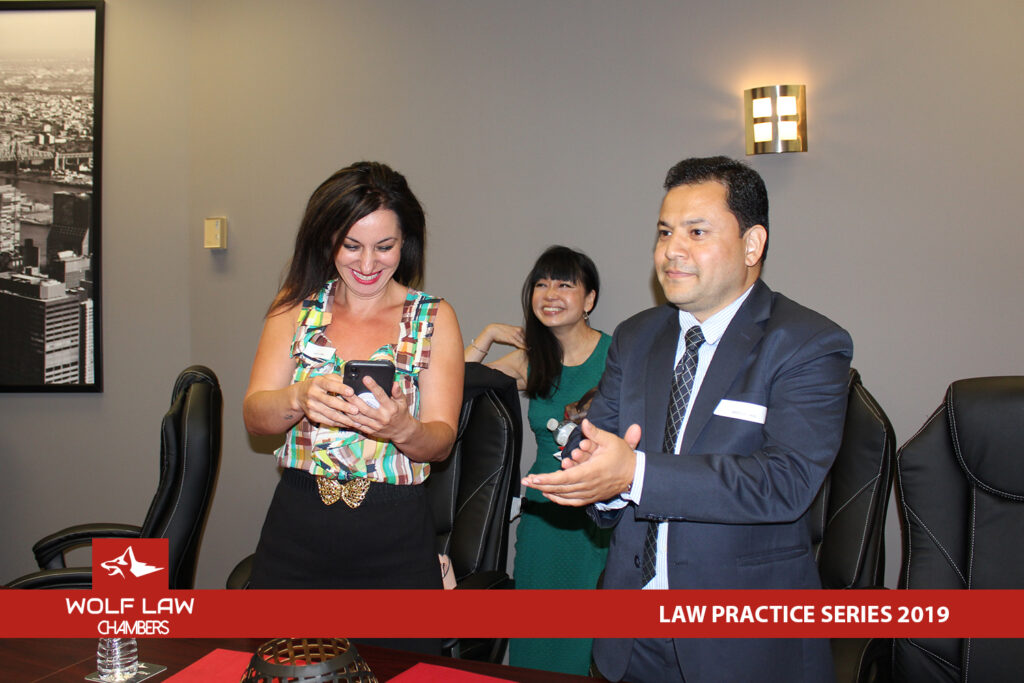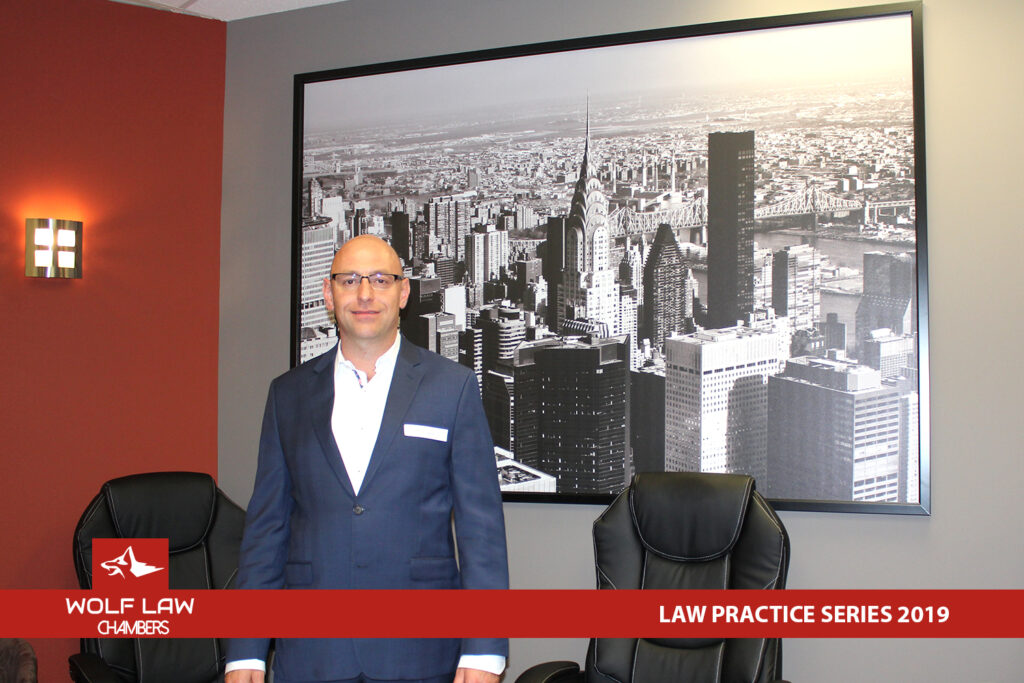LEGAL
7 Tips for Solo Practitioner Lawyers to Maximize Their Billable Hours
In the competitive and fast-paced legal industry, solo practitioners face unique challenges, particularly when it comes to managing and maximizing billable hours. Unlike larger firms that have departments dedicated to different aspects of the business, solo lawyers often wear multiple hats, from handling client cases to managing administrative tasks. However, with strategic planning and the right tools, solo practitioners can efficiently maximize their billable hours, ensuring a successful practice. Here are seven practical tips to help solo lawyers make the most out of their working hours:
1. Leverage Technology
Investing in the right technology is crucial for solo practitioners looking to streamline their workflow and increase productivity. Legal practice management software can automate administrative tasks such as scheduling, billing, and client communication, freeing up more time for billable work. Additionally, adopting document automation tools can significantly reduce the time spent on drafting legal documents.
2. Implement Time Tracking from Day One
Effective time management starts with accurate time tracking. Utilize digital time tracking tools to record every minute spent on a client’s work, including phone calls, emails, and research. This practice not only ensures that you are billing accurately but also helps in identifying non-billable tasks that might be consuming a significant portion of your time.
3. Set Clear Boundaries
For solo practitioners, work can easily spill over into personal time, making it difficult to maintain a work-life balance. Establishing clear boundaries between work and personal time can help you stay focused and productive during work hours. This includes setting specific work hours and communicating your availability to clients.
4. Prioritize Tasks
Not all tasks are created equal. Prioritize tasks based on urgency and importance, focusing on billable work that directly contributes to your revenue. Consider delegating or outsourcing non-billable tasks, such as administrative duties or marketing efforts, to free up more time for client work.
5. Batch Similar Tasks
Batching involves grouping similar tasks and tackling them together in a dedicated time block. This method reduces the mental load and time lost in switching between different types of tasks. For instance, designate specific times for client meetings, email correspondence, and legal research to improve efficiency.
6. Maintain a Healthy Work-Life Balance
Burnout is a real risk for solo practitioners who try to maximize billable hours at the expense of their well-being. Ensure you’re taking regular breaks and setting aside time for personal activities and rest. A well-rested lawyer is more productive and can provide better service to clients.
7. Continuously Evaluate and Adjust Your Strategies
The legal industry and your practice will evolve, so it’s important to regularly assess your productivity and billing practices. This might involve reviewing your billing rates, evaluating new technology solutions, or adjusting your work habits based on what’s working and what’s not.
By implementing these seven tips, solo practitioner lawyers can more effectively manage their time, maximize billable hours, and build a thriving practice. Remember, the goal is not only to increase productivity but also to maintain a high quality of service for your clients and a balanced life for yourself.
How Wolf Law Chambers’ Business Hours Phone Answering Services Boost Efficiency
In the competitive and demanding field of law, every second counts, especially during business hours when the pace intensifies. Wolf Law Chambers recognizes the unique challenges law firms face in managing their time and resources efficiently. Their business hours phone answering services are designed to alleviate these pressures, ensuring that law firms can focus on their core activities while never missing an important call. Let’s explore the benefits of integrating Wolf Law Chambers’ services into your daily operations and how it can transform your law firm’s productivity and client satisfaction.
Enhancing First Impressions
The initial contact between a law firm and a potential client sets the tone for the entire relationship. Wolf Law Chambers ensures that each call is answered promptly and professionally, providing a positive first impression that reflects well on your firm. This professional handling reassures clients and prospects of your firm’s commitment to excellence, even before they’ve officially become your client.
Efficient Call Management
During the hustle and bustle of business hours, managing incoming calls can be a significant distraction for your legal team, pulling them away from their critical legal work. Wolf Law Chambers’ phone answering services expertly manage your calls, allowing your team to concentrate on their tasks with fewer interruptions. This efficiency is vital for maintaining productivity and meeting the demands of your caseload.
Customized Call Routing
Not all calls require immediate attention from your senior legal staff, yet distinguishing between them in real-time can be challenging. Wolf Law Chambers offers customized call routing, ensuring that calls are directed to the right person at the right time. Whether it’s a new client inquiry, a call from the court, or a routine administrative question, their team can screen and route calls based on your firm’s specific instructions. This targeted approach prevents disruptions and ensures that high-priority calls receive the urgent attention they deserve.
Reducing Administrative Burden
Your administrative staff plays a crucial role in the smooth operation of your law firm. However, if they’re constantly managing a high volume of calls, their ability to perform other essential tasks can be compromised. By leveraging Wolf Law Chambers’ phone answering services, you can alleviate this burden, freeing your staff to focus on high-value activities that enhance your firm’s operations and client service.
Maximizing Billable Hours
Every minute your legal team spends on non-billable tasks is a minute not spent generating revenue for your firm. In the legal profession, where billable hours are a key metric of success, optimizing the time your team spends on client work is crucial. Wolf Law Chambers’ phone answering services play a pivotal role in ensuring that your legal team’s time is used as efficiently as possible, maximizing your firm’s profitability.
Strengthening Client Relationships
Timely and professional communication is the backbone of strong client relationships in the legal field. Wolf Law Chambers helps ensure that your clients’ calls are always answered within business hours, conveying a message of reliability and attentiveness. This consistent communication standard can significantly enhance client satisfaction and loyalty, contributing to your firm’s long-term success.
Conclusion
Incorporating Wolf Law Chambers’ business hours phone answering services into your law firm’s operations offers a strategic advantage, allowing you to optimize your time, enhance client satisfaction, and improve your bottom line. By entrusting your call management to their professional team, your firm can focus on what it does best: delivering exceptional legal services. Embrace the change and watch your law firm thrive in efficiency and client relations.
We are in Toronto
We have double the reason to celebrate this Canada Day. We have found the best place to open our Law Chambers in downtown Toronto! Our third location will be opening on July 1, 2021 (Happy Canada Day!) in the Richmond-Adelaide Centre on the 29th floor. We have a beautiful view of the city and the CN Tower. Join the Wolf Law Chambers community today and revel in the stunning views of Toronto.
Wolf Law Chambers Toronto

Legal professionals in Toronto will finally have access to the industry’s leading services offering full-service office space for small and medium firms, which are also located in Mississauga and Oakville.
Wolf Law Chambers provides an elegant workspace to allow legal professionals to grow their business and network while maintaining their independence. We offer spacious and fully furnished private offices, secretarial workstations, and boardrooms, along with a full range of administrative and support services found in established law firms so that you can focus on your legal practice.
At Wolf Law Chambers you will belong to a community of legal professionals that actively share knowledge, experience and referrals; the ideal conditions to help your practice grow and succeed.
Wolf Law Chambers members are able to focus their time on what really matters: practicing law. We take care of the administrative tasks involved with running an office. From furnishing your office, to setting up the security system and maintenance, our professional team takes care of your packages, greets your clients and makes sure that you and your clients are in a safe and clean space, disinfecting the common areas regularly.
Your private office in Toronto

At Wolf Law Chambers Toronto you will find spacious offices with lots of natural light and big windows providing a stunning view from the 29th floor.
All you need to bring are your computer and files. The offices are furnished with L-shaped desks, lockable filing cabinets and chairs for you and your clients. We leave the decoration of the office up to you.
You can “hang your own shingle” and have your nameplate on your door and at reception.
You will have a private and secure internet connection, as well as printer, scanner and fax services. A shredding service will guarantee the safe disposal of your confidential documents.
At the front desk, our office coordinator greets your clients, receives and sends your packages and manages the maintenance of the office.
For your convenience, we have several services available online, including a booking app to book the boardroom and a messenger app to communicate with colleagues and the Wolf Law Chambers team.
Basically, with a private office at Wolf Law Chambers Toronto all you need to care about are your practice and clients.
You will have access to the office 24/7 including the boardroom. So you can meet your clients in our sophisticated/elegant boardroom after hours and on weekends.
Premium Virtual Office in Toronto

If you are looking to expand your practice to Toronto or work from home, the Virtual Office is a great option for you. You will have a professional address in the core of downtown Toronto where you can meet and impress your clients.
With a virtual office you are a member of the pack, so you will have access to our referral network and our social and CPD credit events. On top of that, we will help you to promote your practice with a micro-website and social media posts.
Like other members, our office coordinator will take care of your packages and clients, and not even notice that your office is not physically with us.
Remember: We want you to succeed!
Location, Access and Parking

Wolf Law Chambers Toronto can be found on the corner of Adelaide St. West and York St. in the Richmond-Adelaide Centre within the financial district, steps away from the entertainment district and deep within downtown’s vibrant business community.
Our offices can easily be reached by car, transit, bike or on foot.
Our building is easily accessed from the Don Valley Parkway and the Gardiner Expressway. There is underground parking as well as other nearby parking options, such as the parking lot at City Hall.
If you prefer to take transit, the King and St. Andrews subway stations are minutes away, and Union Station and the Go Transit services are close by as well. The Richmond-Adelaide Centre is also connected to the PATH that connects Toronto underground enabling you to avoid the wind, snow and rain.
If you prefer to take your bike, the Richmond-Adelaide Centre has underground bike racks and changing rooms on the premises.
Premises

The Richmond-Adelaide Centre is a beautiful building with many amenities such as a food court, car wash and care, a fitness centre, outdoor space, and a concierge. Anything you could think of to make working away from home easier, this building has it, including dental clinics, a pharmacy and printing services.
The Richmond-Adelaide Centre has a beautiful patio and outdoor space where you can bring your food to eat and enjoy the sun. In 2020 a large sculpture, Dreaming by Jaume Plensa, was unveiled in the courtyard by Oxford Properties. Plensa hopes the sculpture will inspire all who see it to look inward, contemplate and dream of the future.
Services

Wolf Law Chambers has many services designed to help make our members’ practices run more smoothly and to free up their time to focus on the law and their clients. Included among our many amenities we have binding services available for binding court documents, live reception services where we greet and welcome clients as well as send and receive packages. As part of our community, legal practitioners also have unique access to our referral network and readily available witnesses and commissioners.
Security

As we are lawyers ourselves, we understand the paramount importance of confidentiality and security. To that end each private office will have their own separate internet connection. All the furniture as well as the offices are equipped with locks. We have installed an internal surveillance system to maintain the security of the Chambers at all times. Confidential documents can be discarded in a locked container which will be emptied and destroyed by a certified company. Working amongst a community of legal practitioners has the added benefit of a shared understanding amongst all the members regarding the importance of confidentiality and security. There is no better or safer space to set up a law practice.
Meet Clients in a Professional and Impressive Space

Wolf Law Chambers Toronto, like our other locations, has been exquisitely designed by the interior designers at Silver Elephant. The vibrant artwork is inspiring and motivating. Canyon-inspired walls and carpets complement the sleek finishes of the furniture. Natural light beams through tall windows and even on rainy days, the view is magical. Our boardroom combines the comfort of a meeting space, accents of Earth’s natural wonders and the inspiring view of the Toronto skyline to make a space that is both functional and destined to impress your clients.
Join Wolf Law Chambers Toronto!

Wolf Law Chambers is the place to be. It will help you save money in a professional and safe environment. Be surrounded by people that understand what your profession demands and will help you avoid distractions so that you can grow your practice. The best thing is: you are not alone. Our regular social events and office activities will keep you connected, supported and help you decompress.
Don’t waste time; schedule a tour or a phone meeting with a member of our team NOW.
Click here to schedule an in-person meeting to see our beautiful facilities.
To get more information about our services, schedule a phone meeting here.
If you want to learn more about our locations click here.
We will help you grow your practice.
At Wolf Law Chambers, we’re here to help you succeed
Presentation Skills for Lawyers – Webinar Event
We would like to give a huge thank you to Max Beaumont from Potato Chip Communications for adjusting his presentation “Presentation Skills for Lawyers” to fit an online medium. Although we were not able to participate in some of the interactive exercises that were originally planned before COVID-19 arrived and online meetings became the norm, Max still made the session fun, interactive and memorable.
Everyone has experienced the nervousness that comes with giving public presentations, perhaps reminding us of that first middle school presentation that felt like a flop! Max understands this nervousness and outlines six major things to focus on to improve our presentation skills: mindset, body language, audience interaction, conversational delivery, and simple messages.
The biggest takeaway was mindset and audience interaction.

Our natural bent when explaining our presentation before our peers or others is to focus on ourselves: not messing up, slowing down our speech, getting sales, how we’re coming across. Bottom line? We’re thinking about ‘me’. Max challenged us to change our mindset, shifting it from the mechanics we’re engaging in to get our message across, to instead think about our audience, to listen to ourselves as if we were sitting in their shoes. In addition, he let us in on the ‘secret sauce,’ the key ingredient to channeling our nervousness into a presentation that achieves a conversational style and engages our audience in an accessible way. By the end, we all left the meeting with something to think about.
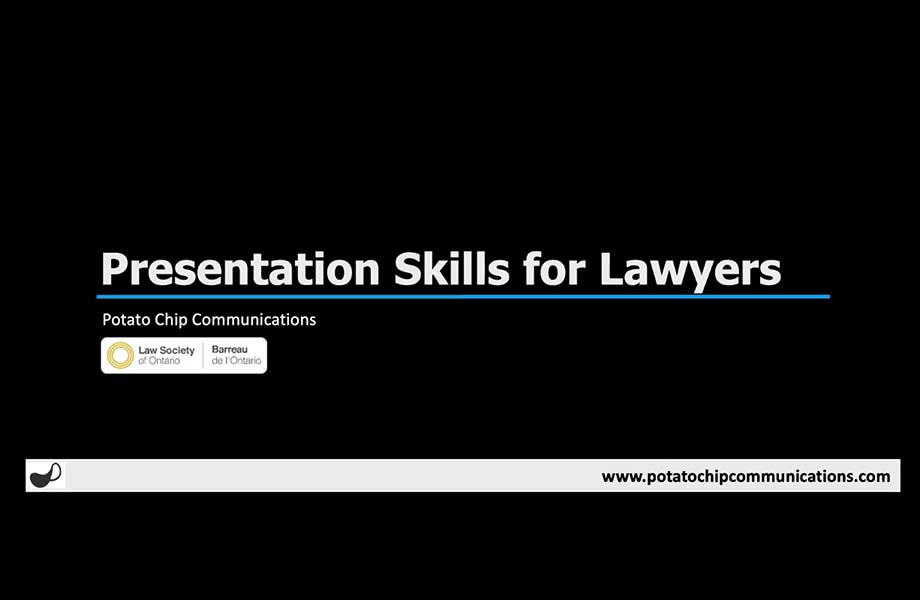
This is one of the benefits of being a member of Wolf Law Chambers, that from time to time we come together as a community of professionals to participate in ongoing educational seminars that are also open to friends of Wolf Law Chambers. And of course, the credits gained by attending count towards a legal practitioners’ annual requirement for continuing education.
We invite you to join us for our next seminar. Who knows? Maybe Max will be back.
What are your rights and obligations during the declared emergency?
Here’s a primer on the Emergency Management and Civil Protection Act.
This past long weekend you may have observed more police and provincial offences act officers out and about at public parks and in the community.
Police and provincial offences officers are now responsible for responding to calls related to the Emergency Management and Civil Protection Act (the “Act”) invoked by the Province of Ontario and as well as ensuring the public’s general compliance with it.
An emergency was declared by an Order in Council (Ontario Regulation 50/20) on March 17th, 2020 pursuant to section 7.0.1 of the Act. It was recognized that the outbreak of a communicable disease, namely COVID-19, constituted a “danger of major proportions that could result in serious harm to persons.”
The initial period of the declared emergency was for fourteen days. It was extended a further fourteen days until April 13, 2020. On the recommendation of the Premier, the Assembly may by resolution extend the period of an emergency for additional periods of no more than twenty-eight days.
There have been a number of orders made under the Act which cover things like price gouging on hand sanitizer or the pick up and delivery of cannabis (if you are a holder of an authorization) during the declared emergency.
The emergency declaration has also called for a number of measures including:
- Closure of establishments (for example, all bars and restaurants, except to the extent such facilities provide takeout food and delivery) O. Reg 51/20
- The mandatory closure of non-essential workplaces (O. Reg. 82/20)
- Closure of outdoor recreational amenities (which includes outdoor playgrounds and outdoor sports facilities) O.Reg.104/20
- Strict restrictions on the size of organized public events, social gatherings, and conducting religious services, rites and ceremonies, being limited to 5 persons (except for members of single household), funeral services (not more than 10 people) O.Reg. 52/20
There are penalties in place for breaching the orders. Keep in mind that there are also provisions for the enforcement of these orders.
For example, officers may require an individual to provide their correct name, date of birth and address if they believe that a person has committed an offence (O. Reg. 114/20).
Failing to comply with any of the emergency orders is an offence under the Act but so is the failure to identify oneself accurately.
For example, failing to correctly identify one self carries a fine of $750 for failure to comply with an order made under the Act or $1,000 for obstructing any person in exercising a power if a provincial offences officer issues a ticket.
This is a significant departure from the law prior to the declared emergency. In my criminal practice I am often asked by my clients whether they are required to identify themselves to police upon request. My standard answer to that question was, “well that depends.”
If police stop you while you are driving or cycling you DO have to show the police identification. (This is required by the Highway Traffic Act and municipal bylaws.) But in many cases, if the police simply stop you on the street I tell my clients that you don’t have to show the police your identification or answer their questions.
An important caveat is that during the declared emergency – the scope of police powers are now significantly broader. If police or provincial offences officers have grounds to believe that you are breaching the Act, you should hand over your identification.
Finally, there is one last question I wish to address. Are the police stopping cars with two or more occupants and issuing tickets under the Act?
There have been rumours swirling on social media recently that police forces in the GTA are issuing tickets under the Act when there are two ore more people in a car if they do not live at the same address.
In fact, this rumour became so pervasive that Peel, Durham and York Regional Police have taken to social media to confirm that officers have NOT been directed to ticket vehicle occupants when there are two or more people in a car. Peel Police, however, DID recommend limited the number of people in any car to family, to limit the spread of the virus.
Be well and stay safe.
-Michelle Johal
Michelle Johal is a local criminal defence lawyer. She can be reached at [email protected]
Michelle Johal is a member of the Wolf Law Chambers community.
For more information on being a member try our free office calculator now.
Reinventing the legal framework
Dezso Farkas
The significance of a man’s prestige is a collective reflection of all his attributes. Dezso Farkas is a man of many attributes. Apart from being a law practitioner and an entrepreneur who helps start-ups, Dezso is responsible for the conception of Wolf Law Chambers. The chambers, described as a multi-disciplinary law practice, is an innovative approach to providing a workplace where legal professionals can seek support and resources, while maintaining their status as a singular entity.
Educational Background
Dezso graduated with a BA Honours degree from York University and then went on to earn his Master of Laws (LLM) degree (specializing in Corporate Governance) and a Juris Doctor (JD) degree, both from Osgoode Hall Law School, York University. Soon after he was called to the Bar and currently, he is licensed to practice as a Barrister & Solicitor in the Province of Ontario.
Apart from periodically visiting the courthouse, Dezso made time to publish several articles in the prestigious Delaware Journal of Corporate Law, Transnational Legal Theory Journal and the London Review of International Law. On a certain occasion Dezso also served with the Institute for Global Law and Policy at Harvard Law with his expertise on the legal side.
Professional Ventures
The scope of Dezso’s abilities is not just limited to law. On top of being a real-estate entrepreneur with considerable experience in the field, in the past Dezso has also acted as a director of the Reliant Gold Corp., a publicly traded junior mineral resources company.
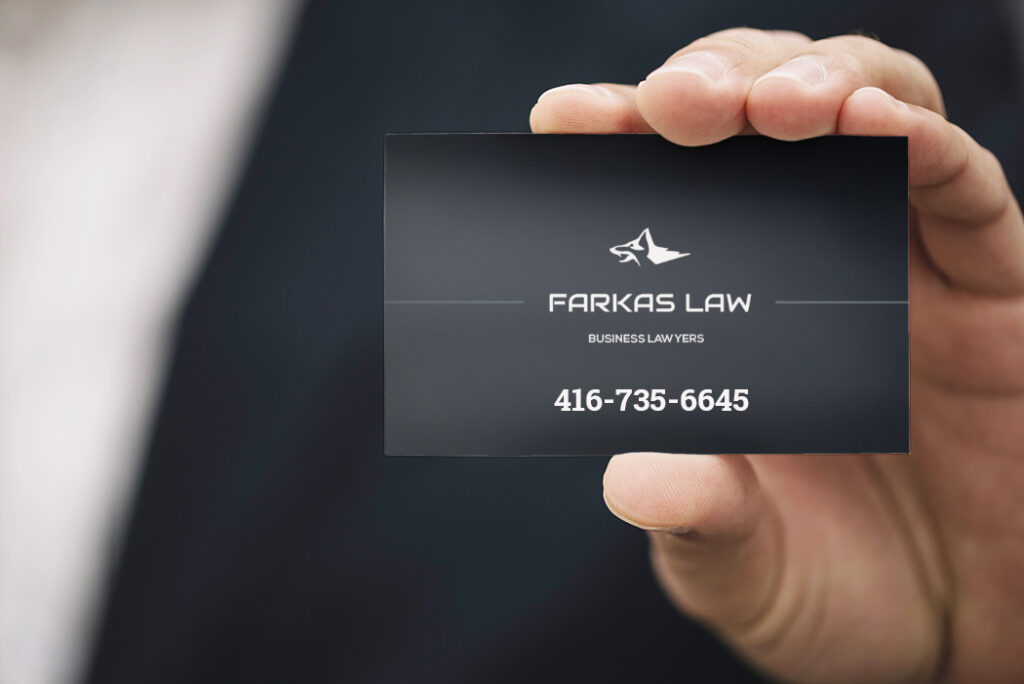
Farkas Law “Business Lawyers”, the independent law firm chaired by Dezso Farkas, caters to the needs of small and medium-sized business clients. The self-description of the firm is stated as a body of “Business Lawyer” with an aim to provide customized legal services, guidance and trusted advice for business ventures of all kinds. Currently the clientele of Farkas Law includes start-ups, commercial landlords, real-estate developers, manufacturing companies, non-profit organisations and small business owners. The firm acts as an external “in-house” corporate counsel to save their valuable resources and focusing them towards successful outcomes.
Dezso’s substantial history of merit is a result of his personal ideology which can be better expressed by himself:
I believe in continuous professional growth and I am committed to gaining new knowledge and experience to better serve the needs of my clients.
Dezso Farkas

Vision
Ideally lawyers are intended to be a means of resolving problems for their clients. Sadly, not all lawyers are attuned to the needs of their clients. For Dezso Farkas, the motivation to become a lawyer came from his own unsavory past experience. As a young entrepreneur, Deszo encountered some obstacles and to resolve them he obviously pursued legal assistance; unfortunately, he got saddled with a ‘disengaged’ lawyer. At this point Dezso realized how detached lawyers are to the ideology of young entrepreneurs. Back then, if he had been a lawyer, he definitely could have handled his case more efficiently, he realized that going into law practice could be a real opportunity for him to help people.
Young entrepreneurs have no idea of the trouble they might get into when they are starting out. Its not possible for them to know everything about the line of commerce they are about to enter on their own. The consequences of their natural ignorance can sometimes be dire. Consequently, it is more complicated to undo a problematic situation than to avoid it in the first place.
Nevertheless, if an entrepreneur seeks the right advice from the very beginning, there’s no reason for them to get into trouble. According to Dezso, the biggest complaint he hears from his clients is that other lawyers don’t understand their clients’ businesses. Dezso on the other hand wants to understand his clients’ businesses and perspectives. He has a desire to leave people better than when they first came to him seeking a solution to their problems. In his own words, Dezso wants to be ‘Their Trusted Advisor’.
Wolf Law Chambers

Not all lawyers have the innate ability and the right personality to make it as sole practitioners. Lawyers who possess such qualities cannot work under others for long and can only thrive when they work for themselves. However, when these lawyers enter the domain of sole practice, they face a multitude of unique challenges they are not ready for. Support is non-existent as a result of their isolation and limited networking opportunities. The Law Society provides certain resources, to help solo firms stay compliant, but they have no avenue of providing any personalized advice in light of the ever-evolving business landscape to individual lawyers. In terms of modern-day workspace flexibility, the options for a lawyer on his own are very limited. Sometimes it becomes practically impossible for them to go out and search for law-based developmental resources to further their practice.
To Dezso the idea behind the creation of Wolf Law Chambers came as a solution to all the problems discussed above, which are being faced by lawyers. The services available at Wolf Law Chambers are uniquely targeted for law professionals, in order to allow them to grow personally in their sphere. The networking opportunities at Wolf Law Chambers are incredibly advantageous for sole practitioners. All the available resources, connections and events, allows lawyers to seek counsel from others in their profession, without any prejudice and with the purpose of benefiting each other. All of this is being carried out by lawyers at Wolf Law Chambers, while retaining their status as owners of their own law firms.
All lawyers should seek every opportunity they can to enhance their practice.
Dezso Farkas
Future
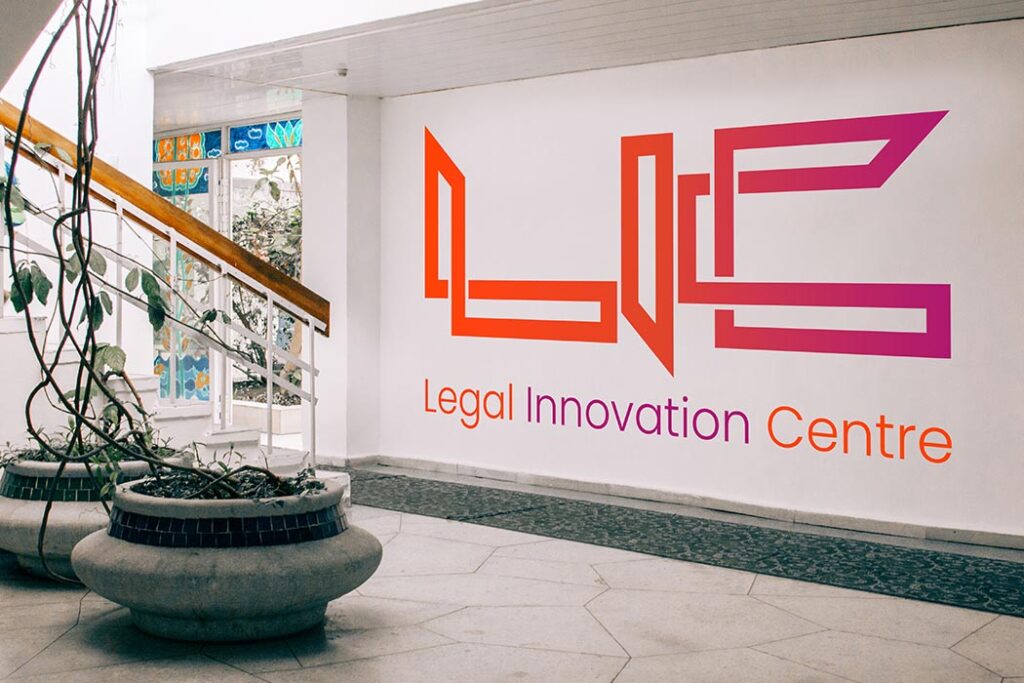
For Dezso Farkas, the future is just as promising as his present. He’s already planning to launch his upcoming project; the Legal Innovation Centre. Legal Innovation Centre will act as a ‘technology incubator’ to mentor start-ups in areas of legal research and development. According to Dezso, currently technology start-ups in the GTA West area are facing many challenges. There is a definite need for a facility like Legal Innovation Centre. The center will alleviate issues using their 3-step assistance plan; finding funding programs, providing a collaborative space and introducing start-ups to an already established network of industry experts. Legal Innovation Centre will focus resources on technological innovations which aim to shape the legal industry.
Networking Event – Legal Outsourcing vs. Hiring New Talent
Thank you to our fellow sole practitioners, the marvellous Peter Carayiannis from Conduit Law, and most welcomed guests for joining us on Thursday, August 15th, 2019 at Wolf Law Chambers. The topic of discussion for our event was the practicality that lies in outsourcing legal work in comparison to hiring new talent. Initially, sole practitioner, Dezso Farkas, of Farkas Legal Professional Corporation, spoke on the misconceptions in the legal field about outsourcing tasks to staff or legal clerks.
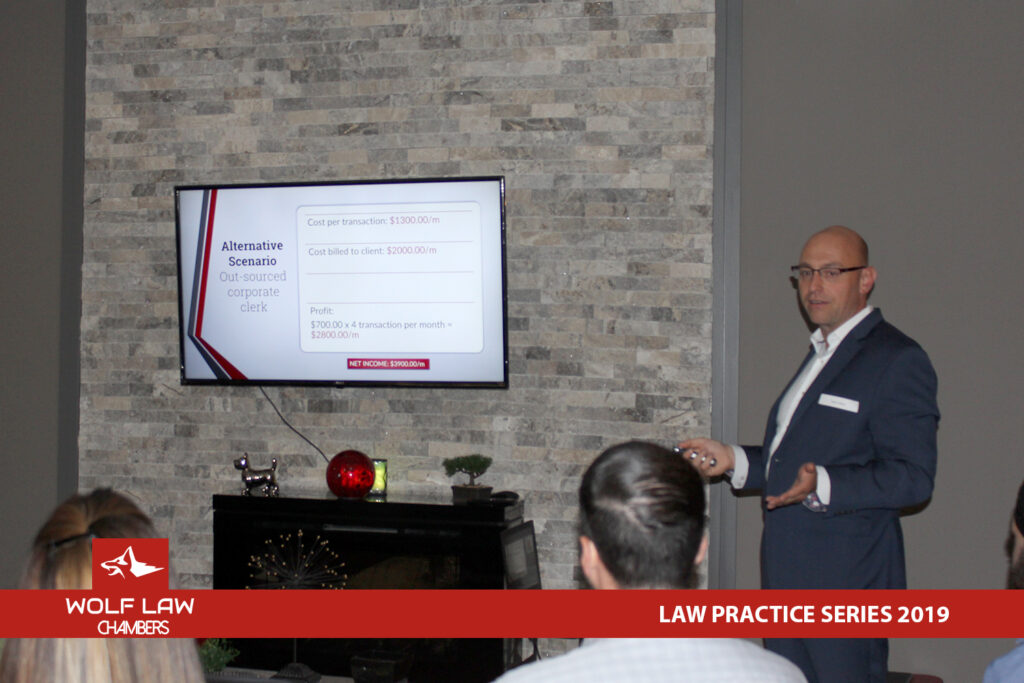
He explained how sole practitioners have a false perception that entails them carrying out every task that is part of the profession. Doing so, takes up a significant portion of their day and they are left with little to no time for billing clients. Mr. Farkas used accurate figures and analysis to depict how hours spent on practice management can be outsourced to staff and/or legal clerks to spend more time on actual legal work that can be billed. This leaves room to yield higher returns immediately, and is significantly compounded over longer durations of time. Legal outsourcing may seem like a discouraging practice as one has to shell money out of their pocket at first, but the time left to actually work on files and bill clients summons more profits for legal professionals.
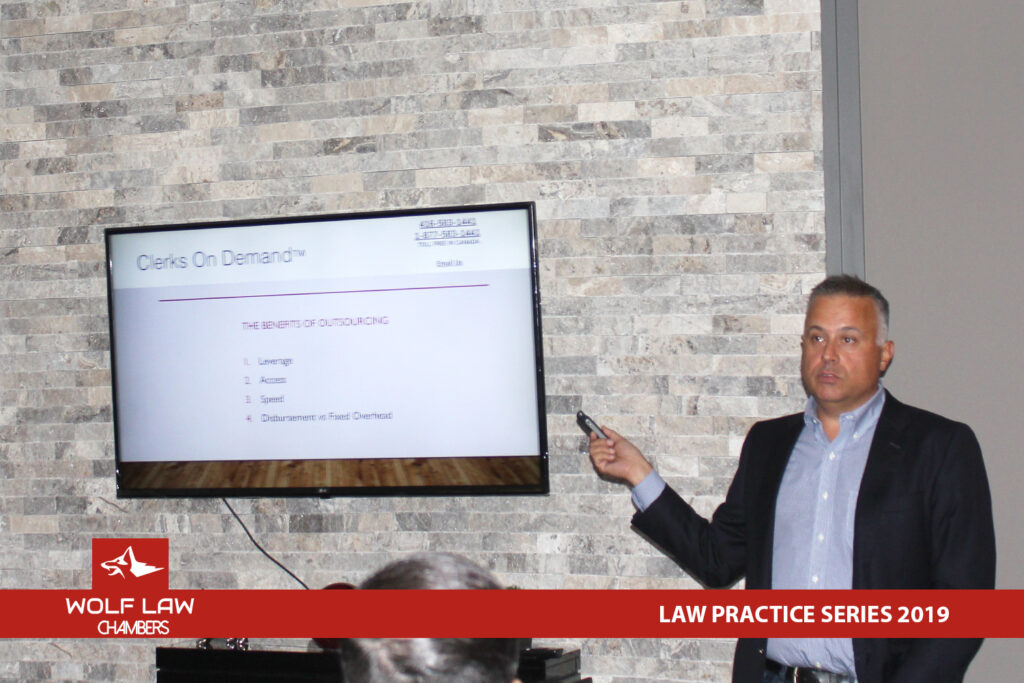
Peter Carayiannis from Conduit Law and Clerks on Demand outlined the many advantages legal outsourcing can have on one’s legal practice. He explained the differences between hiring new talent and outsourcing tasks to a company like Clerks on Demand. Essentially, hiring new talent thoroughly involves a recruitment process, training that has to be given, dealing with employee needs, and the constant thought of an employee leaving, leading to the whole process occurring again. Legal outsourcing, on the contrary, encompasses the passing of particular tasks to a professional and certified legal clerk, who is capable/experienced enough to complete assignments on their own. They can even be hired for a particular task or a specific period of time, allowing sole practitioners to leverage their time accordingly. Lawyers can then apply themselves to other facets of their practice, which in turn, allows for a yield of more returns. Peter brought up an interesting point during his presentation. He insisted that the audience understand the practicality behind outsourcing certain tasks of their legal practice. If a lawyer is not serving their client’s needs by performing a certain task, it should be outsourced to a legal clerk who can take care of it, while the lawyer works on more important matters, that serve the client’s legal needs directly.
Many of the sole practitioners present at the event saw the immediate benefits from outsourcing various areas of their practice to staff or legal clerks, and by doing so, being able to better focus and serve client needs. Some lawyers even noted the benefit in taking on more tasks than they would normally be able to handle by simply hiring clerks. Peter’s company, Clerks on Demand, allows lawyers to do exactly that. They can hire clerks at any time to assign tasks that they may not want to carry out and/or have the resources/time to complete. They would still be able to supervise all operations without having to indulge completely. With that said, any aspect of legal practice that does not serve the purpose of going to law school and receiving a legal education, can be contracted out, allowing lawyers to leverage their time accordingly.
A workspace designed to provide sole practitioners many opportunities to leverage their time efficiently is Wolf Law Chambers. The Wolf Law Chambers team incorporates innovative technological practices in their office to allow for rapid communication between lawyers, staff, and clientele. They also offer many services to sole practitioners deciding to join them, such as easily accessible office coordinators, marketing specialists, and process servers. These individuals are staffed to allow lawyers within the chamber to focus on what really matters: serving their client’s needs and executing the legal work that they specialize in.
We loved the turnout for the event and hope to continue seeing both familiar and new faces for the future. We have a workshop coming up again on Tuesday, August 27th, 2019 from 6-9 P.M. with guest speaker, Humza Adam of HFactor Solutions. Humza will be providing business development and marketing strategies for both lawyers and paralegals. We hope to see you soon!

Come in and see the exceptional services Wolf Law Chambers has to offer for you and your clientele. Currently, there is a Wolf Law Chambers location in the heart of Mississauga, and we are proud to announce the opening of another location at 227 Lakeshore Road East, Suite 408, in downtown Oakville. Wolf Law Chambers is dedicated to being easily dependable and providing sole practitioners with all the resources they need to succeed in the legal profession. Please feel free to book a tour and join us in building a community of sole practitioners striving to set new standards.
The Advantages of Incorporating your Professional Practice
Since November 1st, 2001, professionals have been entitled to incorporating their practice under the Business Corporations Act as provincial governments changed their incorporation laws to include professionals [1]. Incorporating a professional practice is a pivotal step forward in securing financial advantages. Whether it be through tax deferrals, individual pension plans, health and welfare trusts, the lifetime capital gains exemption, and/or limited shareholder liability, incorporating enables professionals to benefit from potential advantages that would not be available if they operated under sole proprietorship.

Tax Deferral
Tax legislation makes a corporation a separate taxpayer and its own legal entity [1]. Deferring taxes may single handedly be the most beneficial aspect of incorporating your legal practice. The income earned within a corporation is taxed at two separate levels: at the corporate level and then again at the personal level when the income gets distributed [2]. Once you incorporate, tax rates for the corporation become significantly lower than personal tax rates. There is flexibility that lies in deferring personal taxation as corporate surplus inside the corporation. This can defer one’s personal income taxes and although these tax-deferred funds will be withdrawn at some point in time, it is clear that the compounding effect can be very beneficial over long periods of time [3].
Income earned from operating your professional practice within a corporation is taxed at a lower corporate tax rate than the income you may earn under sole proprietorship. Sole proprietors are taxed at an individual marginal tax rate, for which the highest marginal tax rate for individuals in some provinces and territories was higher than 50% for 2018 [4]. The marginal income tax rate will increase for an individual as income increases. On the contrary, professional income earned within a corporation is subject to being taxed at a lower corporate tax rate. In 2018, this rate ranged from 26.5% – 31%, which is significantly lower than the former figure [5]. Lower corporate tax rates for active business income leaves professionals with more after tax income within the corporation to invest at their discretion.
Furthermore, corporations that are legally defined as a Canadian controlled private corporation (CCPC), can benefit from the federal small business deduction. This benefit lowers the tax rate even further on the first $500,000 of active business income [4]. This figure is known as the ‘business limit’ and it varies by province/territory. The small business deduction rate also varies by province and territory, and the combined federal and provincial tax on income subject to the small business rate ranged from 12% to 22% in 2018 [5]. That is definitely not bad a tax rate that would otherwise be 38%, which is what the corporate would have to pay according to Part I of the Income Tax Act [2].
| Small Business Deduction Limits/Rates (2019) | Small Business Limit | Rate % | Combined Fed/Prov. Rate% |
| Federal | $500,000 | 9.00 | |
| Provincial: | |||
| Alberta | $500,000 | 3.00 | 12.00 |
| British Columbia | $500,000 | 2.00 | 11.00 |
| Manitoba | $425,000 | 0.00 | 9.00 |
| New Brunswick | $500,000 | 2.50 | 11.50 |
| Newfoundland and Labrador | $500,000 | 3.00 | 12.00 |
| Northwest Territories | $500,000 | 4.00 | 13.00 |
| Nova Scotia | $350,000 | 3.00 | 12.00 |
| Nunavut | $500,000 | 4.00 | 13.00 |
| Ontario | $500,000 | 3.50 | 12.50 |
| Prince Edward Island | $500,000 | 3.50 | 12.50 |
| Quebec | $500,000 | ||
| Without MPP* | 8.00 | 17.00 | |
| MPP* | 4.00 | 13.00 | |
| Saskatchewan | $500,000 | 2.00 | 11.00 |
| Yukon | $500,000 | ||
| Without MPP* | 2.00 | 11.00 | |
| MPP* | 1.50 | 10.50 |
*Manufacturing and Processing Profits Tax Credit

IPP’s
An individual pension plan (IPP) is specifically designed for an incorporated professional and/or business owner of an incorporated company, age 40 or over [1]. With that said, it is not to say that someone under 40 cannot contribute to an IPP. An IPP is funded by corporate assets with the intention of providing post-career income to the contributor. IPP investments grow on a tax-deferred basis and usually provide higher contributions than those permitted by Registered Retirement Savings Plans (RRSP’s) [1]. Additionally, fees incurred from setting up and administering an IPP are tax deductible by the employer [1].

Health and Welfare Trusts
A health and welfare plan is a corporate arrangement set up by the employer and can provide employees compensation for medical and/or dental expenses. Coverage extends from the incorporated professionals to those employed by the corporation. This plan can provide coverage for medical expenses incurred outside of provincial or insurance plans. This tax-free benefit can make medical and dental expenses tax deductible for the corporation [5].

Lifetime Capital Gains Exemption
Each Canadian was entitled to a capital gains exemption of up to $848,252 in 2018 and this figure is indexed annually [4]. The Lifetime Capital Gains Exemption (LCGE) enables shareholders to reap the benefits of significant tax breaks on capital gained through the sale of private company shares. This is solely applicable to qualified small business corporation sales but is a benefit every Canadian is entitled to. Family members who own shares of a single professional corporation can multiply the LCGE available upon the sale of the qualified small business corporation, resulting in significant tax savings [3].

Limited Shareholder Liability
Incorporating your professional practice limits the liability of the corporation’s shareholders. Unless a shareholder has provided a personal guarantee, they are not subject to responsibility for the corporation’s liabilities. Nonetheless, a professional corporation does not protect individuals from personal liability for negligence [5].
Closing Remarks
Incorporating your professional practice provides endless potential for possible tax breaks, retirement savings, health benefits, minimizing capital gains on the disposition of private company shares, and protection from potential legal liabilities. With that said, professionals operating in different fields should definitely consider incorporating their practice as it is a simple process that presents an abundance of opportunity for one’s welfare. If you are still not sure about what incorporating can do for you, contact a professional who knows exactly how to help.

Greater Toronto Area based lawyer, Dezso Farkas, who operates under FARKAS LEGAL PROFESSIONAL CORPORATION, has helped many professionals incorporate their practice from start to finish. He has advised corporations and caters his services to their needs in order to maximize potential benefits. He believes in helping businesses grow and enabling business owners to benefit from the advantages that can be sought through incorporation. For professional advice please feel free to contact Mr. Farkas at (416) 735-6645.
-Narvir Goindi
[1] RBC. ‘Is incorporating your professional practice right for you?’ (2018) 6:2 Investment, tax and lifestyle perspectives from RBC Wealth Management Services. https://www.rbcwealthmanagement.com/ca/en/research-insights/is-incorporating-your-professional-practice-right-for-you/detail/ [2] Service Ontario. ‘Incorporating a business corporation’ (2019) Business and economy. https://www.ontario.ca/page/incorporating-business-corporation [3] Rotfleisch & Samulovitch P.C. ‘Lawyers Advantages of Incorporation – Ontario Tax Lawyer Comments’ (2019) Taxpage.com. https://taxpage.com/articles-and-tips/incorporation/lawyers-advantages/ [4] TurboTax Canada. ‘Lifetime Capital Gains Exemption’. (2019) SAVINGS & INVESTMENTS. https://turbotax.intuit.ca/tips/lifetime-capital-gains-exemption-6258 [5] Acton, Alan. ‘Should you incorporate your legal practice?’ (2010) CANADIAN LAWYER. https://www.canadianlawyermag.com/news/general/should-you-incorporate-your-legal-practice/267749







